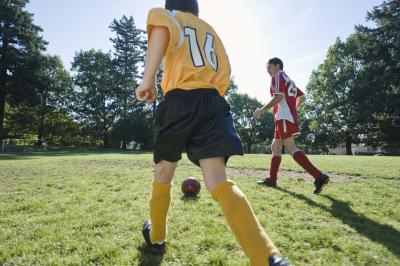When a child gets moving, her heart gets pumping. This temporary heart rate increase is a desirable result of physical exertion, as it strengthens the heart muscle and makes your kid more fit. When your child is next engaged in rambunctious play, take a second to check his exercise heart rate. By doing so, you can ensure that your child is getting the maximum health benefit from his exercise and that everything is up to par in terms of his heart functioning.
Heart at Rest
A child’s resting heart rate level depends, in large part, upon her age. For infants, a resting heart rate is expected to be between 100 and 160 beats per minute. In children who are 1 to 10 years old, this resting heart rate should be between 70 and 120 beats per minute. Adolescents and young adults between the ages of 10 and 18 should have a resting heart rate between 60 and 100 beats per minute.
Maximum During-Exercise Rate
To determine your child’s maximum exercise heart rate, you must again consider her age. A child’s maximum exercise heart rate can be calculated by subtracting his age from 220. For example, a 10-year-old’s maximum exercise heart rate should be 210, while the maximum exercise heart rate for a 16-year-old should be 204. While exceeding this heart rate maximum temporarily is not a big deal, if your child’s exercise heart rate regularly passes this calculated number, it could be cause for concern.
Benefits of Heart Rate Boost
While the racing heart that commonly accompanies exercise may initially seem a bit scary, rapid heart rate during physical exertion is actually beneficial. The faster your child’s heart pumps as he engages in physical activity, the more effectively he is working this vital muscle and the healthier it will ultimately get.
Over-Maximum Interventions
If you notice that your child’s exercise heart rate is well above his desirable max, help him slow his pulse a bit. Ask him to sit down, provide him with some water to drink and, if you are in a warm environment, move him to a cooler location. By doing this, you can ensure that your child suffers no ill effects.
When to Speak to Doctor
You generally have no reason to fret over your child’s exercise-induced heart race; however, if you notice that your child’s heart takes a long time to slow down, it may be worth mentioning to his doctor. If your child’s heart appears to be working harder than the hearts of others in his age group, it could be cause for minor concern. Additionally, if you notice upon taking your child’s pulse that his heart rate is highly irregular, you may also want to mention this to his physician as it could be a sign of minor heart dysfunction.





